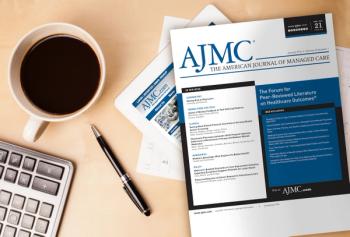
Using a body-worn sensor to detect falls at home is feasible for elderly individuals, including those with Parkinson disease, who have a higher risk of falling, according to new study findings.

Christina is the associate editorial director of The American Journal of Managed Care® (AJMC®) and Population Health, Equity & Outcomes, and joined AJMC in 2016. She oversees the publication of the print journals, from manuscript submission to publication, and works with the editors in chief and editorial boards to promote the journals.
She has a BS in public health from Rutgers University. You can connect with Christina on LinkedIn.

Using a body-worn sensor to detect falls at home is feasible for elderly individuals, including those with Parkinson disease, who have a higher risk of falling, according to new study findings.

Results of a subgroup analysis within a randomized, controlled trial show that the monoclonal antibody dupilumab (Dupixent) improved clinical and patient-reported outcomes among patients with chronic rhinosinusitis (CRS) with nasal polyps and comorbid asthma.

A study of pairs of twins revealed that obstructive sleep apnea and measures of the disorder seem to be heritable, but daytime sleepiness is mostly influenced by environmental factors.

A new study has found a dose-dependent relationship between coffee consumption and reduced severity of tremors in men with Parkinson disease.

Prior to the launch of solriamfetol (Sunosi) for narcolepsy and obstructive sleep apnea, the Drug Enforcement Administration designated it as a Schedule IV drug, indicating that it has a low potential for abuse and a low risk of dependence. Around the same time, results from the phase 3 TONES 3 study were published, showing the drug’s efficacy in increasing wakefulness and reducing sleepiness.

The August issue of The American Journal of Managed Care® (AJMC®) featured research on surprise medical billing policies, social determinants of health, and the value of chimeric antigen receptor T-cell therapies, among other topics. Here are 5 findings from research published in the issue.

Researchers aiming to better understand the role of estrogen in the development of Parkinson disease (PD) and its potential as a treatment found that brain-selective estrogen therapy resulted in motor improvements in male mice with PD-like symptoms.

The clinical manifestations of symptoms experienced by children and adolescents with narcolepsy can differ from those seen in adults, presenting barriers to a timely diagnosis.

An analysis of patients’ and caregivers’ willingness to participate in genetic studies on Parkinson disease found that although overall levels of motivation were similar in Hispanic and non-Hispanic patients, the reasons behind this interest varied between the groups.

In a phase 3 study, solriamfetol demonstrated both safety and efficacy in patients with narcolepsy. The selective dopamine and norepinephrine reuptake inhibitor has a mechanism of action different from other wake-promoting agents.

Findings of a retrospective study show that comorbid psychosis and depression in patients with Parkinson disease are associated with greater disease severity and higher healthcare utilization.

Results of a study on patients with early-stage Parkinson disease (PD) add to the evidence showing an association between PD and pulmonary function and point to the potential use of respiratory center drive to identify early PD.

The likelihood of patients with multiple sclerosis (MS) maintaining their employment status in 2 years can be predicted by their levels of physical disability and executive functioning, but not by other measures of cognition, according to new study findings.

The July issue of The American Journal of Managed Care® (AJMC®) featured research on co-pay accumulator adjustment programs, heroin overdoses among the insured, and potential savings from steering patients to lower-priced services, among other topics. Here are 5 findings from research published in the issue.

Research findings suggest that sleep disturbances are associated with central parkinsonian pain in patients with Parkinson disease. Both sleep disturbances and pain are common disabling nonmotor symptoms of the disease.

In addition to motor symptoms, Parkinson disease (PD) can also result in nonmotor symptoms like cognitive impairment and eventual dementia. Researchers have identified brain structure changes associated with worsening cognition in hopes that it can lead to a better understanding of the mechanisms of PD.

Conference coverage from the annual meeting's of the Florida Society of Clinical Oncology's annual meeting and ISPOR.

The June issue of The American Journal of Managed Care® (AJMC®) featured research on care coordination and low back pain therapy in addition to studies on its theme of oncology. Here are 5 findings from research published in the issue.

The May issue of The American Journal of Managed Care® (AJMC®) featured research on diabetes drug cost-effectiveness, patient-centered medical homes, and value-based insurance design. Here are 5 findings from research published in the issue.

The April issue of The American Journal of Managed Care® (AJMC®) featured research on deaths in opioid users, colorectal cancer screening, and health system competition. Here are 5 findings from research published in the issue.

In a discussion at the 2019 Spring Session of the Florida Society of Clinical Oncology, speakers provided updates to the treatment landscape for lung cancer and presented a case study from the clinic.

Making lifesaving but costly cancer therapies available to patients requires collaboration across the healthcare system, agreed a panel of stakeholders at the Business of Oncology Summit hosted by the Florida Society of Clinical Oncology.

In a panel discussion during the Business of Oncology Summit hosted by the Florida Society of Clinical Oncology, survivors and caregivers described how their cancer journeys were affected by financial toxicity.

The treatment of lung cancer with personalized medicine has come a long way in recent decades, but still more achievements remain to be seen, said Bruce Johnson, MD, FASCO, immediate past president of the American Society of Clinical Oncology, during his keynote speech opening the Business of Oncology Summit hosted by the Florida Society of Clinical Oncology in Kissimmee, Florida.

Leveraging technology to perform real-time prescription benefit checks could give patients and providers personalized cost knowledge when a drug is being prescribed, but standardization of the process is needed for wider uptake, according to a session at the Academy of Managed Care Pharmacy Managed Care & Specialty Pharmacy Annual Meeting.

A trio of posters presented at the Academy of Managed Care Pharmacy Managed Care & Specialty Pharmacy Annual Meeting show that high healthcare utilization leads to substantial costs among individuals living with HIV, but prompt initiation of antiretroviral therapy (ART) regimens after diagnosis can help contain costs in both Medicaid-covered and commercially insured patients.

Several efforts are underway nearly a year after the Trump administration released its blueprint to lower drug prices in May 2018, but tracking their outcomes depends on what metric is used to define drug prices, according to a session at the Academy of Managed Care Pharmacy Managed Care & Specialty Pharmacy Annual Meeting, held March 25-28 in San Diego, California.

Utilization management tools and formulary designs are components of a multifaceted strategy to curb opioid overdose death rates, but they must be applied in a flexible manner, according to speakers at the Academy of Managed Care annual meeting.

Aimee Tharaldson, PharmD, senior clinical consultant in emerging therapeutics for Express Scripts, presented her look at the development pipeline to a crowded room at the Academy of Managed Care Pharmacy Annual Meeting, held March 25-28 in San Diego, California.

In a session at the Academy of Managed Care Pharmacy Annual Meeting held March 25-28 in San Diego, California, speakers discussed the value-based contract process in Medicaid from both the manufacturer and the payer perspectives.

259 Prospect Plains Rd, Bldg H
Cranbury, NJ 08512
© 2025 MJH Life Sciences®
All rights reserved.
